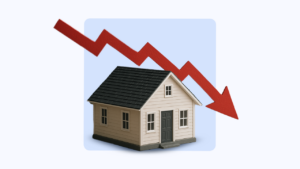Best time to buy a house: Why spring is ‘homebuying season’

Key takeaways
- Late spring and early summer are typically considered peak homebuying season.
- However, the increased competition among buyers can lead to higher prices.
- Buyers hoping to score a deal may want to wait until fall or winter, when competition — and prices — typically ease.
Historically, spring and summer have been the busiest times in the real estate market. But the traditional seasonality of homebuying and selling was upended by the pandemic: Home sales slowed significantly amid stay-at-home orders, then dramatically spiked, and the market remained volatile for quite some time.
The good news is, things have since returned to something closer to normal. One positive sign: After years of a distinct lack of available homes for sale, which kept homebuyers at a disadvantage, Realtor.com is forecasting an 11.7 percent increase in existing housing inventory for 2025. This increase would bring more balance to the supply-and-demand metric — and also more leverage for buyers.
In other words, seasonality may once again become the most important factor in determining the best time of year to buy a house. Here’s what to know about buying in high season versus buying in a more traditionally slow period.
Buying a house in spring or summer
Spring and early summer are the busiest and most competitive time of year for the real estate market. There’s usually more inventory listed for sale than other times of year, and home prices tend to be steeper to reflect the increased demand. Since 2011, the months of February through June have been the most lucrative time to sell, according to a 2024 study by ATTOM Data Solutions, with May in particular earning sellers an average premium of 13.1 percent above market value. The other months in the range all yielded premiums ranging from 12.2 percent to 12.8 percent.
“Typically, sellers choose spring and summer as the time to list as the majority of buyers are out in the market,” says Ryan Jancula, principal and lead broker with Jancula Group at Compass in Los Angeles. “This is a double-edged sword for a buyer, as you will be met with more opportunities but [also] much more competition, which may lead to further increase in prices or less desirable sale terms.”
If you’re hoping to save some money and your timeline is flexible, consider waiting until the rush is over and not starting your home search until mid- or late-summer.
Keep in mind: The most expensive month of the year to purchase a home is May, when seller premiums are as high as 13.1 percent above market value, according to ATTOM data.
Pros
- More listings: The increase in springtime and summertime listings means buyers have more options. “Spring is when the most inventory comes to market and there is likely more choice,” says Victoria Vinokur, a broker with Brown Harris Stevens in New York City.
- Better weather: During warmer months, buyers are more easily able to get out and about to see homes. Home exteriors are easier to see with no snow, and interiors look more inviting when there’s plenty of sunshine coming in.
- More convenient timing: “If buyers have school-age kids, this is the best time to purchase so it doesn’t break up the school year,” says Jane Katz, a New York City real estate agent with Coldwell Banker Warburg. “The transaction should close by [the end of] summer, so kids can start in their new school in September.”
Cons
- Increased competition: This is often the peak time for the real estate industry, which means more buyers are on the hunt — so expect plenty of competition.
- Higher prices: With increased competition comes multiple bids and, likely, higher home prices. Sellers have the upper hand when demand is strong.
- Moving costs: Moving is expensive, and moving companies’ prices are also impacted by supply and demand. Come summer, when demand increases, so will the prices you’ll pay to hire pro movers. The same move will cost you less during winter.
Buying a house in fall or winter
Buying off-season has its benefits, though. The ATTOM study, which analyzed 59 million single-family home and condo sales between 2011 and 2023, showed that October is the month with the lowest seller premium by far at 8.8 percent, compared to May’s 13.1 percent. The next lowest were September and November, both at 9.5 percent. That means October is when homebuyers are likely to get the best deal. In fact, a recent Zillow report declared early fall to be “the next housing sweet spot.”
Keep in mind: The least expensive month of the year to purchase a home is October, when seller premiums are at their lowest, according to ATTOM.
“Late summer and winter tend to be quieter, with a better chance for a buyer to find less competition and a deal,” says Ralph DiBugnara, a vice president at New American Funding and founder of Home Qualified.
Pros
- Less competition: Fewer buyers are looking for homes during the winter, which means there’s less competition to face for available listings. Less-intense competition also typically means more time to spend making a decision.
- More leverage: With fewer buyers, there’s more opportunity to negotiate the best deal possible. “In winter and especially around national holidays, sellers will see less buyer traffic and be more willing to negotiate,” says DiBugnara.
- Motivated sellers: During the quieter fall and winter months, when fewer prospective buyers are shopping, home sellers may be more willing to lower their prices, or offer concessions, to attract those prospective buyers who are still looking.
Cons
- Less inventory: Fewer homes are typically listed on the market during winter, which means fewer choices for buyers.
- Weather issues: Depending on where in the country you live, winter weather can make viewing homes far more challenging. Closings may even be postponed due to adverse weather conditions.
- Home inspection difficulties: It can also be more difficult to inspect homes in cold weather. If there’s snow coating a roof, for example, it can be challenging for an inspector to assess its condition.
Best time to buy a house: Prices and seasonality
Just because spring is the industry’s prime time doesn’t automatically mean it’s the right time for you. You have to consider your personal circumstances as well as seasonality — for example, if you are getting married or having a baby in August, you may not be able to wait nearly a year for a larger home.
“While spring is typically referred to as the homebuying season, that doesn’t necessarily guarantee that it is an optimal time to buy,” says Mark Hamrick, Bankrate’s senior economic analyst.
In addition, if price is of concern to you, you may in fact be better off waiting out the rush. This chart illustrates median home prices since the start of the COVID-19 pandemic, using data from the National Association of Realtors. Once the chaos of the early pandemic died down, the highest price spikes were uniformly in June or July, and the lowest prices occurred in the dead of winter.
Other factors to consider
A number of other factors can impact when might be the best time to buy a house. Here are a few more things to consider.
- Mortgage rates: Mortgage interest rates are not seasonal, but they certainly fluctuate. Throughout 2023, rates spiked sharply. They then dropped, then rose again. And despite high hopes, the Fed cuts in 2024 did not provide much relief for mortgage rates, which remain elevated. “While mortgage rates have edged down from their highs, they are likely to remain above their pre- and early-pandemic levels, when 3 percent to 4 percent rates were common,” says Hamrick.
- Lack of inventory: The shortage of available homes that plagued the country for the past few years has begun to ease, but home prices remain stubbornly high. Realtor.com predicts prices will continue to inch upward throughout 2025, albeit somewhat more slowly than previous years.
- Recession fears: When consumers feel nervous about the economy, especially amid talk of a possible recession, they tend to back off of spending. This holds particularly true for big purchases like a home. If you worry about your income or job security should a recession happen, waiting to buy might be wise, regardless of season.
FAQs
Why we ask for feedback Your feedback helps us improve our content and services. It takes less than a minute to complete.
Your responses are anonymous and will only be used for improving our website.
You may also like


‘We buy houses’ companies in Michigan




